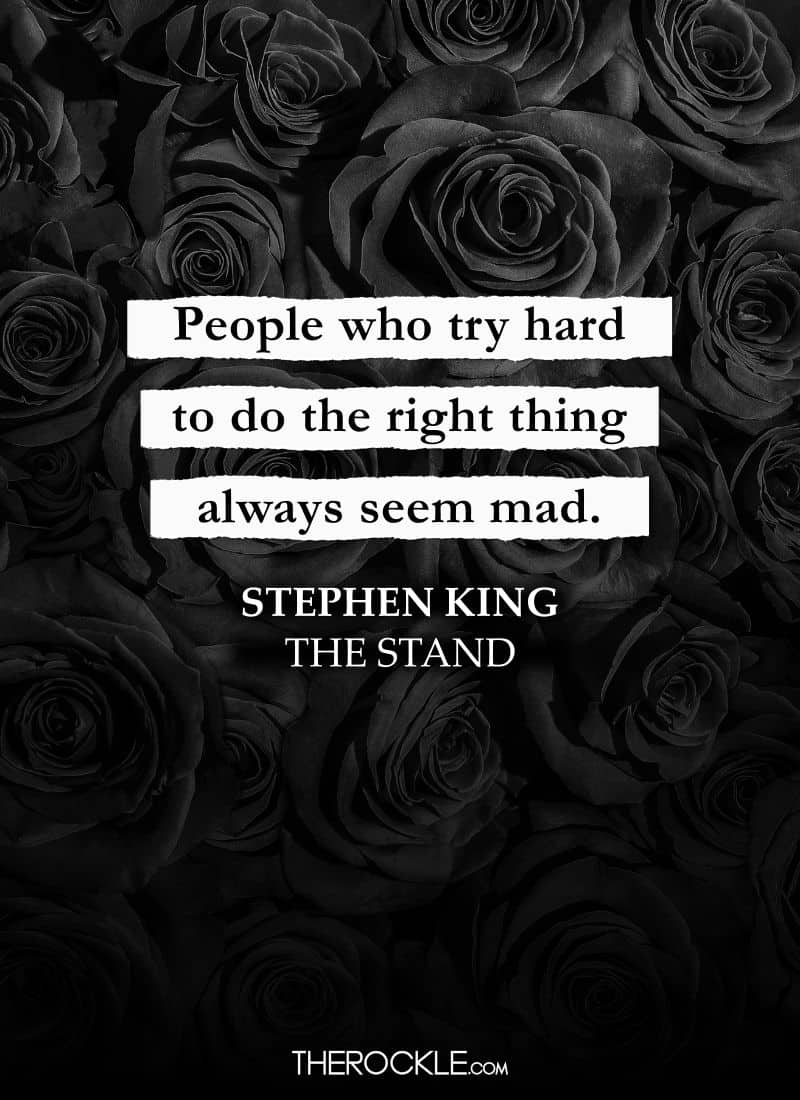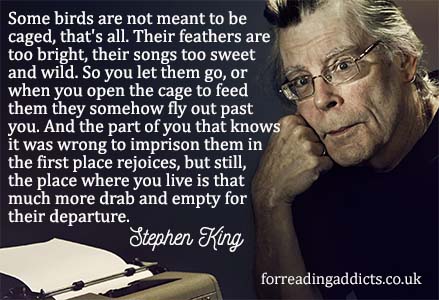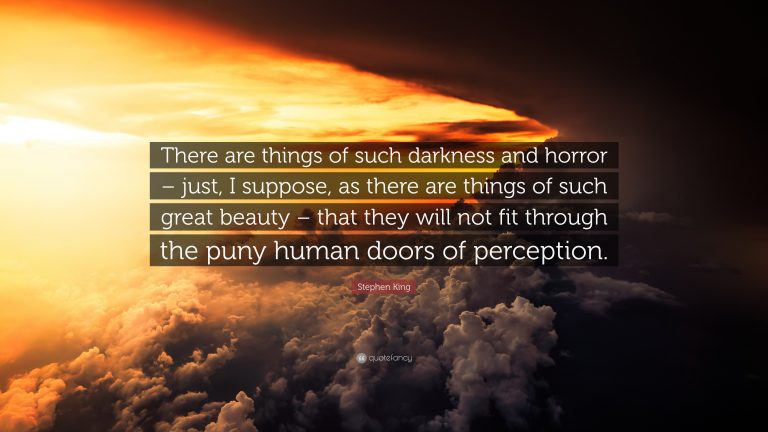Stephen King Quotes: The Art Of Creating Memorable Villains
If there’s one thing that Stephen King is undeniably a master at, it’s creating memorable villains. From the demonic Pennywise in “It” to the psychologically terrifying Annie Wilkes in “Misery,” King has a knack for bringing to life some of the most chilling and unforgettable antagonists in literature. In this article, we’ll dive into the art of creating these villains through a collection of thought-provoking Stephen King quotes. Get ready to explore the dark and twisted corners of King’s mind as we uncover the secrets behind his ability to craft such compelling and haunting characters.
Stephen King once said, “Monsters are real, and ghosts are real too. They live inside us, and sometimes, they win.” These words perfectly capture the essence of King’s approach to villain creation. He understands that true horror lies not only in the external monsters we encounter, but also in the internal demons that reside within us all. Through his writing, King taps into our deepest fears and exposes the darkness that can lurk just beneath the surface. His villains are not mere caricatures of evil, but complex and multi-dimensional beings that reflect the complexities of the human psyche.
In this exploration of Stephen King’s quotes, we’ll uncover the techniques he employs to make his villains so unforgettable. We’ll delve into the importance of creating well-rounded characters, the power of relatability, and the art of instilling fear in the hearts of readers. So, grab your flashlight and prepare to embark on a journey into the mind of one of the greatest horror authors of all time. Get ready to discover the secrets behind Stephen King’s ability to create villains that will haunt your nightmares long after you turn the final page.

Stephen King Quotes: The Art of Creating Memorable Villains
Stephen King, the master of horror and suspense, is renowned for his ability to create memorable villains that haunt our nightmares and keep us turning the pages. From the demonic Pennywise in “It” to the sadistic Annie Wilkes in “Misery,” King’s villains are often just as captivating as his heroes. In this article, we will explore some of Stephen King’s most chilling quotes about the art of crafting these unforgettable antagonists.
The Power of a Well-Written Villain
A well-written villain can make or break a story. They are the catalyst for conflict, the force that opposes the protagonist, and the driving force behind the narrative tension. In the words of Stephen King, “Monsters are real, and ghosts are real too. They live inside us, and sometimes they win.” King understands that the scariest villains are the ones that reflect the darkest parts of our own humanity.
Creating a memorable villain requires a delicate balance of traits and motivations. King believes that a good villain should be multifaceted, with a mix of both relatable and repulsive qualities. They should have a backstory that explains their actions, even if it doesn’t excuse them. As King once said, “The most important things are the hardest to say because words diminish them.” By giving his villains depth and complexity, King elevates them from mere monsters to complex characters that readers can empathize with, even if they can’t condone their actions.
The Influence of Real Life on Villain Creation
Stephen King often draws inspiration from real-life events and people when crafting his villains. He once said, “Fiction is the truth inside the lie.” By weaving elements of reality into his stories, King adds an extra layer of authenticity to his villains, making them all the more terrifying.
In many of his novels, King takes ordinary people and puts them in extraordinary situations, revealing the darkness that can lurk within us all. He explores the idea that anyone, under the right circumstances, has the potential to become a villain. As he famously stated, “Monsters are real, and ghosts are real too. They live inside us, and sometimes they win.” This notion of the darkness within us resonates with readers, reminding us that the line between good and evil is often blurred.
The Role of Fear in Villain Creation
Fear is a powerful emotion, and Stephen King knows how to tap into our deepest fears through his villainous characters. He once said, “We make up horrors to help us cope with the real ones.” King understands that by confronting our fears in the safe realm of fiction, we can better understand and overcome them in reality.
When creating villains, King aims to evoke a sense of dread and unease in his readers. Whether it’s a supernatural entity or a human monster, he wants his villains to be truly terrifying. As he explained, “The thing under my bed waiting to grab my ankle isn’t real. I know that, and I also know that if I’m careful to keep my foot under the covers, it will never be able to grab my ankle.” By acknowledging our fears and shining a light on them, King allows us to confront and conquer them.
The Complexity of Villainous Motivations
Stephen King’s villains are not one-dimensional evildoers. They have motivations and desires that drive their actions, even if those motivations are twisted or morally corrupt. King believes that understanding a villain’s motivations is crucial to creating a compelling antagonist. In his words, “Good fiction is made of what is real, and reality is difficult to come by.”
By exploring the motivations behind his villains, King shows us that evil is not always born, but often a product of circumstance and personal history. This nuanced approach adds depth to his villains and challenges the notion of black and white morality. As King once said, “Monsters are real, and ghosts are real too. They live inside us, and sometimes they win.”
In conclusion, Stephen King’s quotes about the art of creating memorable villains offer valuable insights into his writing process. He understands the power of a well-written villain, the influence of real life on villain creation, the role of fear in villain development, and the complexity of villainous motivations. By following King’s advice, aspiring writers can learn to craft villains that will linger in the minds of readers long after they finish the last page.
Key Takeaways: Stephen King Quotes – The Art of Creating Memorable Villains
- 1. Memorable villains are key to creating suspense and tension in a story.
- 2. Villains should have depth and complexity, making them relatable to readers.
- 3. Stephen King believes that the best villains are those who believe they are the heroes of their own stories.
- 4. Creating a villain with a strong motivation or goal adds depth to their character.
- 5. Stephen King advises writers to take risks and push boundaries when developing villains, making them truly unforgettable.
Frequently Asked Questions
Here are some frequently asked questions about Stephen King’s quotes on the art of creating memorable villains:
1. How does Stephen King approach the creation of memorable villains in his works?
Stephen King is known for his ability to create unforgettable villains in his novels. He approaches the task of crafting these characters with great care and attention to detail. King believes that a truly memorable villain should have depth and complexity, with motivations and desires that readers can understand, if not sympathize with. He also emphasizes the importance of making villains relatable, as this allows readers to connect with them on a deeper level.
In addition, King believes in the power of ambiguity when it comes to villains. He often leaves room for interpretation, allowing readers to question the nature of evil and the motivations behind it. By doing so, he creates villains that linger in the minds of readers long after they finish the book.
2. What are some of Stephen King’s most memorable villains?
Stephen King has created numerous memorable villains throughout his career. One of his most iconic villains is Pennywise the Clown from his novel “It.” Pennywise embodies the concept of pure evil and preys on the fears of children. Another notable villain is Annie Wilkes from “Misery,” a deranged fan who holds a famous author captive and inflicts unimaginable torture upon him.
Other memorable villains include Randall Flagg from “The Stand,” a charismatic and enigmatic figure who represents the embodiment of evil, and Jack Torrance from “The Shining,” a man whose descent into madness is chillingly portrayed. These villains, and many others in King’s works, have become ingrained in popular culture and continue to haunt readers’ nightmares.
3. What makes Stephen King’s villains so effective?
Stephen King’s villains are known for their ability to strike fear into the hearts of readers. One of the reasons for their effectiveness is King’s skill in creating fully fleshed-out characters. His villains are not one-dimensional monsters, but complex individuals with their own motivations and backstories. This makes them feel more real and relatable, heightening the sense of terror.
Additionally, King excels at building suspense and tension in his storytelling. He knows how to keep readers on the edge of their seats, constantly guessing what the villain will do next. This creates a sense of unease and anticipation, making the reading experience all the more thrilling.
4. How do Stephen King’s quotes about villains inspire other writers?
Stephen King’s quotes about the art of creating memorable villains have inspired countless writers in the horror and thriller genres. His emphasis on crafting complex, relatable villains has encouraged other authors to delve deeper into the psychology of their own antagonists. King’s ability to blur the lines between good and evil has also influenced writers to explore moral ambiguity in their own works.
Furthermore, King’s success as a writer and his ability to captivate readers with his villains serve as inspiration for aspiring authors. His quotes remind writers that creating unforgettable villains is a crucial element in crafting a compelling and engaging story.
5. How have Stephen King’s villains impacted popular culture?
Stephen King’s villains have had a significant impact on popular culture. Many of his villains, such as Pennywise the Clown and Jack Torrance, have become iconic figures in the horror genre. They have been adapted into films and television series, further cementing their place in the collective consciousness.
Additionally, King’s villains have influenced other forms of media, such as video games and music. Their dark and menacing presence has inspired artists across various mediums to create their own interpretations of these memorable characters. Stephen King’s villains have become a part of our cultural lexicon, forever etched in the annals of popular culture.
Stephen King Reveals His Top Five Stephen King Stories
Final Thoughts: Unleashing the Magic of Stephen King’s Villains
And there you have it, dear readers – a glimpse into the captivating world of Stephen King’s villains and the art of creating memorable antagonists. Throughout this article, we’ve explored the wisdom embedded in King’s quotes, revealing the secrets behind his ability to craft characters that haunt our nightmares and linger in our minds.
By delving into the depths of human psyche, King masterfully taps into our deepest fears and anxieties, painting vivid portraits of villains that resonate with readers on a profound level. His villains are not mere caricatures, but complex beings with their own motivations and stories, making them all the more terrifying. Whether it’s the demonic Pennywise or the tormented Annie Wilkes, King’s villains leave an indelible mark on our literary landscape.
So, as you embark on your own creative endeavors, remember the lessons learned from Stephen King. Embrace the darkness within, explore the depths of your characters’ souls, and unleash the magic that lies in creating unforgettable villains. Just like King, you have the power to captivate readers and leave them breathless with your storytelling prowess. Now, go forth and let your imagination run wild!






